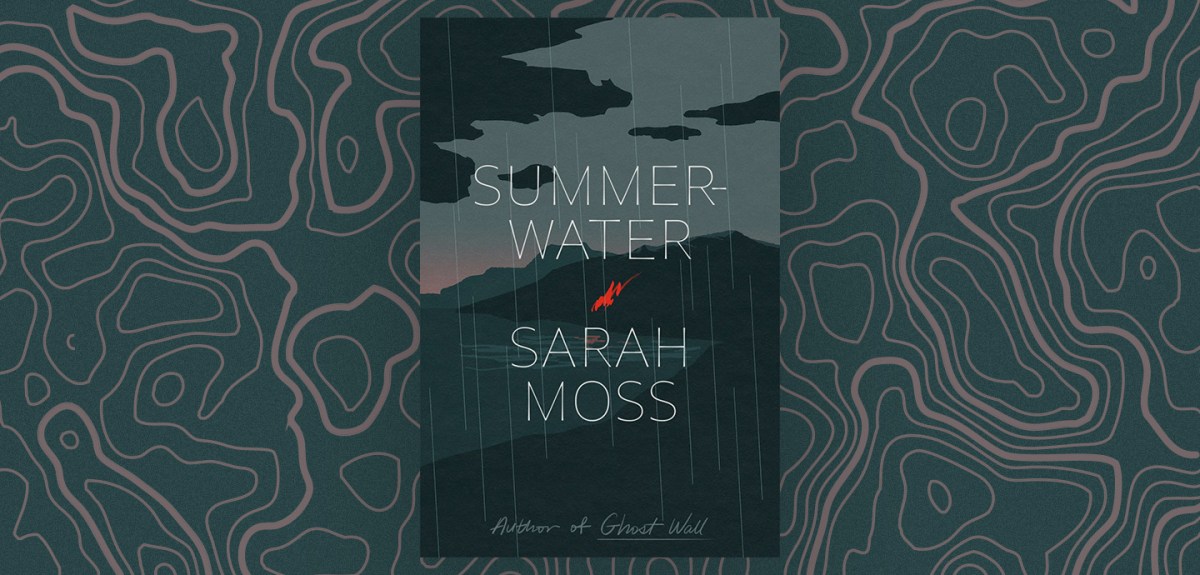[ad_1]
Sarah Moss’s seventh novel, Summerwater, follows her acclaimed Ghost Wall (2018), and takes its cue from 19th century English poet Sir William Watson’s “The Ballad of Semerwater.” The poem tells an old legend about a mysterious traveling beggar who arrives in the prosperous town of Semerwater in northern England’s Yorkshire Dales. In response to the townsfolk’s cruelty and disregard, the beggar invokes a curse that floods and submerges the town – “deep asleep till Doom” – beneath Lake Semerwater. The poem’s dark and eerie undertones capture the mood of this angst-filled story of seven families vacationing in Scotland, so engagingly told by Moss in her characteristically streamlined and suspenseful prose.
Summerwater’s action takes place in a remote park situated on a lake and over the course of an oppressive summer day with “clouds the colours of bruises.” Nature, far from a soothing, verdant backdrop, becomes a threatening force. Several rustic cabins – some owned, others rented – house various configurations of families in search of some holiday fun. The torrential rain, however, never lets up, making it nearly impossible for the vacationers to venture outdoors. “You don’t live your whole life in Scotland,” says one character, “to be scared of the rain, but this weather is odd, too much, the rain drilling the ground and churning up mud. Erosion not irrigation.”
This sense of erosion, or wearing away, seems increasingly to pervade the small group of cabin-dwellers, too, who are losing patience as they find themselves feeling more and more isolated and unmoored. With no cell service and little to keep them occupied, they are confined to the company they keep (not always happily so) and their own disquieting thoughts. In their state of suspended animation and boredom, they also become more inclined to keep close watch on their neighbours, forming impressions of one another from a distance. One cabin’s inhabitants in particular become the focus of curiosity and, later, something much worse.
Within the walls of each cabin, Moss subtly renders the delicate intricacies and troubled dynamics of family life. David, a retired doctor, and his wife, Mary, have been coming to the lake for 30 years. Their children now grown, they are alone to navigate their older years and Mary’s advancing cognitive decline. Josh and Milly are at the other end of their relationship, newly together, communicating primarily through sex, and trying to determine if they’re compatible enough for the long haul. Justine, a woman who runs obsessively despite doctor’s orders, and her angry husband, Steve, are a middle-aged couple with two kids and not much else between them.
Claire and Jon, English transplants to Scotland, are in the midst of the overwhelming early years of parenting two small children. Teenagers Alex and Becky are vacationing with their parents and hating every moment away from their friends and cell phones. Similarly, Jack’s parents insist that he and his malicious little sister Lola be outdoors despite the weather. And finally there is the Shevchenko family, a mother Alina and her daughter Violetta (about whom we learn almost nothing except through the speculations of the other families), whose loud music, late parties, supposedly inappropriate attire, and foreign-sounding surname and language begin to spark outrage in their fellow vacationers.
Moss previously alluded in her novel Ghost Wall, to the dangers of a resurgence of nationalism and xenophobia in the age of Brexit, and here in Summerwater she picks up this thread again. The UK’s decision to leave the European Union has reportedly only intensified the racism experienced by immigrants, and particularly by Roma travellers from Eastern European countries. The Ukrainian Shevchenkos, Scottish residents for 20 years, are an unwelcome group among the other families, all of whom are UK citizens. They are assumed to be illegal immigrants, possibly travellers, and similar to the weather, their presence is uncontrollable and upsets the status quo. They must be stopped.
Steve, who seems to be the most disturbed by their presence, variously refers to them as Romanians, Polish, and “Bloody Bulgarians,” and specifically to Alina as a “fat cow.” Believing he’s not being racist, he thinks to himself, “Even though they weren’t meant to be here any more, it’s no odds to him that they’re foreign, Romanian or what have you.” He even determines that if they continue to disturb the peace with their loud music, he will “kill them with his bare hands.” This contempt and brutality are not confined to the racist, misogynistic middle-aged white men: young Lola, a child, violently confronts Violetta calling her family the “Shit-chenkos,” and demands to know where they’re really from, saying, “You’re supposed to have left, you know, people like you, did you not get the message?”
As evening arrives at the end of the novel, tensions seek release, and a party breaks out at the Shevchenkos’ cabin. Moss has us on the edge of our seats, anticipating the worst. And while there is a brief moment of hope for healing and human connection among the vacationers, it is soon snuffed out by what feels like inevitable tragedy. The final paragraph of Summerwater is one of the most chilling in recent memory, pointing to the devastating consequences of bigotry and hatred, and to the undeniable mastery of Moss’s storytelling.

FICTION
Summerwater
by Sarah Moss
Farrar, Straus and Giroux
Published January 12, 2021

[ad_2]
Source link
